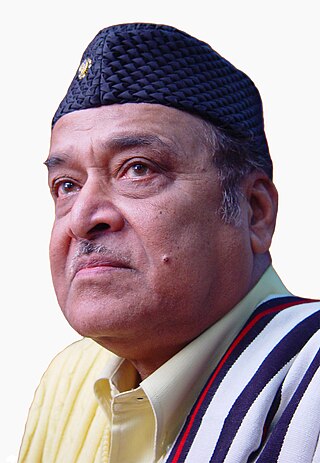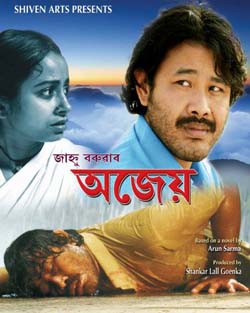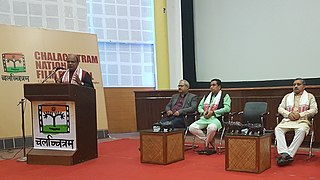
Meitei, also known as Manipuri, is a Tibeto-Burman language of northeast India. It is the official language and the lingua franca of Manipur as well as one of the 22 official languages of the Indian Republic. Native to the Meitei people, it is spoken by around 1.8 million people, predominantly in the state of Manipur, but also by smaller communities in the rest of the country and in parts of neighbouring Myanmar and Bangladesh. It was used as a court language in the historic Manipur Kingdom.

Bhupen Hazarika was an Indian playback singer, lyricist, musician, poet, actor, artist, editor, filmmaker, professor and politician from Assam, widely known as Sudha Kontho. His songs were written and sung mainly in the Assamese language by himself, are marked by humanity and universal brotherhood and have been translated and sung in many languages, most notably in Bengali and Hindi.

Assamese cinema, is an Indian film industry of Assamese-language. It is based in Assam, India. The industry was born in 1935 when Jyoti Prasad Agarwala released his movie Joymoti. Since then the Assamese cinema has developed a slow-paced, sensitive style, especially with the movies of Bhabendra Nath Saikia and Jahnu Barua. In beginning the industry were called Jollywood, named for Agarwala's Jyoti Chitraban Film Studio.
Bhabendra Nath Saikia was a novelist, short-story writer, editor and film director from Assam, India. Dr. Saikia received his doctorate in physics from the University of London. He began his career as a reader in the Department of Physics, University of Guwahati. He later played an important role in the publication of college level textbooks in the Assamese language during his tenure as the Secretary of the Co-ordination Committee for production of textbooks in regional languages.

Jayanta Hazarika was an Indian singer and composer associated with Assamese music. He wrote lyrics for a few songs and composed music for several movies. He was the younger brother of Bhupen Hazarika.

Joymoti or Joimoti is a 1935 Indian film widely considered to be the first Assamese film ever made. Based on Lakshminath Bezbaroa's play about the 17th-century Ahom princess Joymoti Konwari, the film was produced and directed by the noted Assamese poet, author, and film-maker Jyoti Prasad Agarwala, and starred Aideu Handique and acclaimed stage actor and playwright Phani Sarma. The film, shot between 1933 and 1935, was released by Chitralekha Movietone on 10 March 1935 1935 and marked the beginning of Assamese cinema.

Jatin Bora is an Indian actor and director who has appeared in Assamese language films since 1989. He is also an actor and director in some mobile theatre groups of Assam, including Aabahan, Hengool, Ashirbaad, Bhagyadevi, Kohinoor, Itihas and Surjya.

Mon Jaai is a 2008 Assamese language drama film directed by Moirangthem Maniram. The film is about the life of four unemployed educated youths from lower-middle-class families of Tinsukia, Assam who are entangled by their own misfortunes. The film is among 20 outstanding feature films of the country selected for Indian Panorama 2008 and shown in the 39th International Film Festival of India 2008 in Goa held from 22 November to 2 December.

Kopil Bora is an Assamese actor, anchor and All India Radio voice artist. He debuted in Bidyut Chakravarty's 2002 Assamese film Gun Gun Gane Gane and known for his performance in Mon (2002), Ahir Bhairav (2008), Jetuka Pator Dore (2011) and Dwaar (2013).
Pabitra Kumar Deka was a progressive writer, columnist, publisher and editor of monthly magazine, film critic and script writer of the State of Assam in India. He is the winner of the Best Film Critic Award in 1988 from the Eastern India Motion Picture Association. The Government of Assam has instituted the State Best Film Critic Award in the name of Pabitra Kumar Deka Award from 2010 after his death.

Renu Saikia was a prolific actress in the Assamese film industry, who later became famous as character actress, appearing in three well renowned films bringing a new change to Assamese cinema and theatre, where she appeared in hits like Maniram Dewan (1963), made by Harbeshwar Chakraborty, Dr. Bezbaruah (1968), made by Brojen Baruah and Ratanlal (1970s). Her other memorable roles were in some well-known stage plays, Kalyani, Joymoti, Nimila Angko, Taxi Driver and Rajpath - one of the most famous drama-act, which made her way towards the Assamese cinema.
Nipon Goswami was an Indian actor and theatre artist associated with Assamese-language films. He was one of the veteran actors of Assamese Film Industry. He started his acting career as a stage actor and later established himself as a film actor.

Khandkar Mohammad Adil Hussain is an Indian actor who is known for his work in several Indian independent and mainstream film productions, as well as international cinema, in films such as The Reluctant Fundamentalist and Life of Pi . He received National Film Awards at the 2017 National Film Awards for Hotel Salvation and Maj Rati Keteki.

Ajeyo is a 2014 Assamese language drama film directed by Jahnu Barua; based on the Sahitya Akademi Award winner 1997 Assamese novel Ashirbador Rong written by Arun Sharma and adapted as screenplay by the director himself. It was produced by Shankar Lall Goenka and stars Rupam Chetia and Jupitora Bhuyan in the lead roles. The film was released on 3 January 2014.

Raag is a 2014 Indian Assamese-language drama film, starring Adil Hussain and Zerifa Wahid in the lead roles. The film was directed by Rajni Basumatary and produced by Assam State Film Corporation Limited in association with Manna Films. The film was initially released on 7 February 2014 in the state of Assam and later on 7 March 2014 in selected theaters across rest of India via PVR Director's Rare.
Prodyut Kumar Deka is an Indian film director, Screenwriter and Author residing in Assam, India. His films include Dhunia Tirutabur, Samiran Barua Ahi Ase, Surjasta, Borosi, Chiyahir Rong, Ji Golpor Ses Nai and The Government Servant. He turned to writing english fiction gradually from 2016-17 with the anthropological Ambari Series based on the Ambari Archeological site in Guwahati.
Munin Barua was an Indian film director in Assamese cinematography. Among his best-known films are Pita-Putro, Prabhati Pokhir Gaan, Hiya Diya Niya, Daag, Nayak and Bidhata. Barua is widely regarded in Assam to have been one of the directors who helped popularize and establish Assamese cinema outside the state, primarily elsewhere in India where other industries had historically dominated. In 2000, his film Hiya Diya Niya became a first 'blockbuster hit' in Assamese cinema, which helped to revive the Assamese film industry. His another film, Dinabandhu received National Film Award for Best Feature Film in Assamese in 2005.
Tapan Das is an Indian film actor, director and story writer in Assamese cinema and mobile theatre. He also performs in stage plays.

Chalachitram National Film Festival (CNFF) is a festival conducted in Guwahati, Assam. The festival director is Utpal Datta, a National Film Award winning film critic and film maker.
Boloram Das (Balram) is an Indian actor who has appeared in Hindi, English and Assamese films. He is best known his roles in Badlapur Boys, Gabbar is Back and High Jack.












